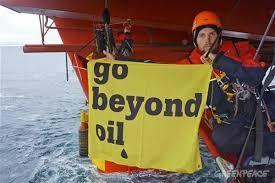
Our society is built on oil. But oil will deplete. And the use of fossil fuel must be drastically reduced a.s.a.p. This will impact every ones lifestyles and the spaces around us. We need to get prepared for this new era.
The 'Beyond Oil' studio at the TU Delft will research, imagine, and design these new spaces or strategies.
An end to our petroleum-based lifestyles and the use of renewable energies will impact our cities and buildings. The Design Studio Architecture and Urbanism Beyond Oil argues that we have to first understand the enormous collective presence of oil in the built environment, its impact on production processes, financial flows, and associated social and cultural patterns in our everyday environment, and the long history of oils impact on our lives. Then, we can imagine the needsand spaces of the future and transform our existing
landscapes, cities and buildings. The Architecture and Urbanism Beyond Oil studio starts with an investigation of how petroleum – its extraction, refining, transformation, and consumption – has shaped our built environment in visible and invisible ways around the world over the last 150 years.
Some students have built on their history thesis exploring oil depictions in Hollywood films or evolving mental maps of oil as a foundation or design. The studio then identifies global landscapes of energy and oil. It maps and translates the findings into accessible visuals, with the goal to develop an architectural, urban or landscape project that address these findings and propose new uses and solutions. The studio has included analysis of the relevance of oil for the urban and architectural form of the port and city of Rotterdam and Dunkerque. Students have imagined possible transition trajectories, notably suggesting a recuperation of the oil-dedicated spaces from the sea-side and new connections across the river. Other students have imagined the transformation of gas stations as lifestyle hubs, roads as energy generators, or floating self-sustaining cities. Design strategies developed in the studio can be applied to cities around the globe and possible research destinations including Rotterdam, Dunkerque, Philadelphia and Curacao.
Open for students from all Dutch institutions. Non-TU students please check: http://tinyurl.com/qam99u4
